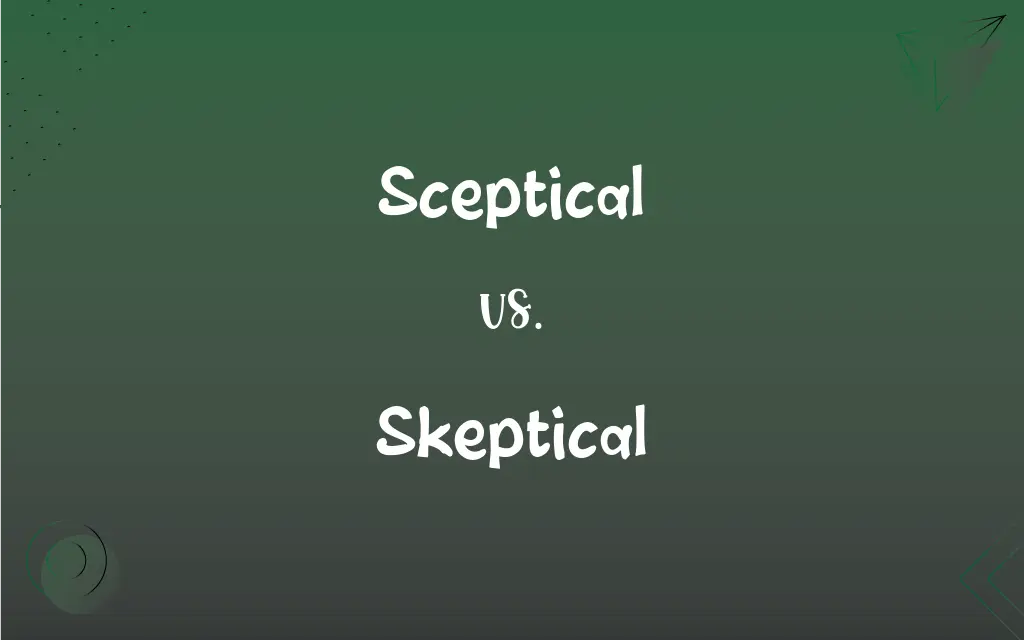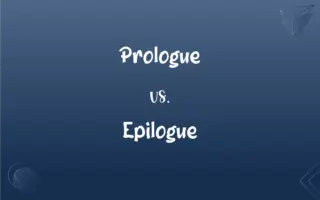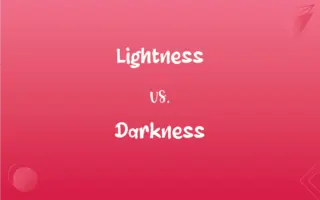Sceptical vs. Skeptical: What's the Difference?
By Harlon Moss & Janet White || Updated on March 4, 2024
"Sceptical" and "skeptical" refer to the same concept of doubt or questioning belief, but their usage differs by region. "Sceptical" is preferred in British English, while "skeptical" is the favored spelling in American English.

Key Differences
The terms "sceptical" and "skeptical" both describe an attitude of doubt towards something or a tendency to disbelieve without sufficient evidence. The difference between them lies primarily in the spelling conventions of British and American English. In British English, "sceptical" aligns with other words that maintain the "c" before the "e," reflecting the language's historical spelling practices. British English often preserves more of these traditional spellings, which can be traced back to the language's Latin and French influences.
Despite these regional spelling differences, "sceptical" and "skeptical" carry the same connotations and are used in similar contexts. They describe a critical approach to understanding the world, emphasizing the importance of evidence and rational thought in forming beliefs and opinions.
The choice between "sceptical" and "skeptical" depends largely on the intended audience and the conventions of the English variant being used. Writers and speakers tend to choose the spelling that aligns with their or their audience's regional language practices, ensuring clarity and adherence to linguistic norms.
Comparison Chart
Spelling
Preferred in British English
Preferred in American English
Meaning
Doubtful or questioning attitude
Doubtful or questioning attitude
ADVERTISEMENT
Usage
Used in contexts where British English is standard
Used in contexts where American English is standard
Pronunciation
Same as "skeptical"
Same as "sceptical"
Origin
Reflects traditional British spelling conventions
Reflects American spelling simplification
Sceptical and Skeptical Definitions
Sceptical
Doubting the truth or reliability of something.
She remained sceptical about the effectiveness of the new policy.
Skeptical
Questioning the validity or authenticity of something.
She was skeptical of the rumors circulating online.
ADVERTISEMENT
Sceptical
Characterized by a questioning attitude.
The sceptical audience was not easily convinced by the speaker.
Skeptical
Insisting on evidence before belief.
Skeptical jurors need convincing proof before delivering a verdict.
Sceptical
Relating to the philosophy of skepticism.
His sceptical approach led him to question established doctrines.
Skeptical
Reluctant to accept something as true.
He remained skeptical about the supposed benefits of the new diet.
Sceptical
Requiring evidence before accepting claims.
A sceptical scientist demands rigorous proof for new theories.
Skeptical
Pertaining to the method of skepticism.
His skeptical mindset made him a cautious investor.
Sceptical
Hesitant to believe without clear evidence.
Despite the hype, he was sceptical about the product's revolutionary claims.
Skeptical
Marked by a doubting or disbelieving attitude.
The skeptical reader critically evaluates every claim in an article.
Sceptical
Marked by or given to doubt; questioning
Skeptical of political promises.
Skeptical
Marked by or given to doubt; questioning
Skeptical of political promises.
Sceptical
Relating to or characteristic of skeptics or skepticism.
Skeptical
Relating to or characteristic of skeptics or skepticism.
Sceptical
Variant of skeptic.
Skeptical
Having, or expressing doubt; questioning.
My teacher was skeptical when I told her my dog ate my homework.
Tom was skeptical when Paul told him that he saw Bigfoot.
Sceptical
Standard spelling of skeptical
Skeptical
Of or relating to philosophical skepticism or the skeptics.
Sceptical
Marked by or given to doubt;
A skeptical attitude
A skeptical listener
Skeptical
Denying or questioning the tenets of especially a religion;
A skeptical approach to the nature of miracles
Sceptical
Denying or questioning the tenets of especially a religion;
A skeptical approach to the nature of miracles
Skeptical
Marked by or given to doubt;
A skeptical attitude
A skeptical listener
FAQs
Is there a difference in meaning between "sceptical" and "skeptical"?
No, there is no difference in meaning; the difference lies only in spelling and regional usage.
Can "sceptical" and "skeptical" be used in scientific contexts?
Yes, both terms are commonly used in scientific contexts to describe a critical, questioning approach to claims and evidence.
Are there other words with similar British and American spelling differences?
Yes, there are many words with similar differences, such as "favour" (British) vs. "favor" (American) and "colour" (British) vs. "color" (American).
How do "sceptical" and "skeptical" relate to academic writing?
In academic writing, choosing between "sceptical" and "skeptical" depends on the preferred spelling convention of the publication or institution.
Does the use of "sceptical" or "skeptical" affect the pronunciation of the word?
No, the pronunciation remains the same regardless of spelling.
Which spelling should I use, "sceptical" or "skeptical"?
Use "sceptical" for British English audiences and "skeptical" for American English audiences.
How should non-native English speakers decide which spelling to use?
Non-native speakers should consider the variant of English they are learning or the preference of their audience or educational system.
Are "sceptical" and "skeptical" interchangeable in dictionaries?
Yes, dictionaries recognize both spellings, often noting the regional preference for each.
How does the spelling variation between "sceptical" and "skeptical" affect language learners?
Language learners might find the variation confusing initially, but understanding regional differences is part of mastering English nuances, helping them adapt their language use to different contexts.
Why do some British English speakers still use "skeptical"?
Some British English speakers may use "skeptical" due to the influence of American media, literature, and the internet, which can blur the distinctions between regional spelling conventions.
How do online platforms handle the spelling differences between "sceptical" and "skeptical"?
Online platforms, especially those with international audiences, often accept both spellings as correct, though spell-check features might suggest the variant more common to the user's language settings.
Are there other examples where British and American English use different letters in the same word, like "sceptical" and "skeptical"?
Yes, there are many examples, such as "theatre" (British) vs. "theater" (American) and "analogue" (British) vs. "analog" (American), reflecting broader patterns of spelling variation.
Can the context change the preference for "sceptical" or "skeptical"?
Yes, the context, such as academic, scientific, or public writing, can influence the preferred spelling based on the audience's expectations.
Are there any professional or academic fields where one spelling is universally preferred?
No, the preference for "sceptical" or "skeptical" generally follows the regional linguistic norms of the writer or publication, rather than being specific to any professional or academic field.
Has the preference for "sceptical" or "skeptical" changed over time?
Preferences for spelling can evolve, but the distinction between "sceptical" and "skeptical" has remained relatively stable, closely tied to the broader American vs. British English spelling differences.
Can the use of "sceptical" in American English or "skeptical" in British English be considered incorrect?
While not technically incorrect, using "sceptical" in American English or "skeptical" in British English may be seen as unconventional and not adhering to the preferred regional spelling norms.
How did historical spelling reforms impact the difference between "sceptical" and "skeptical"?
Spelling reforms, particularly those aimed at simplifying American English spelling, led to the adoption of "skeptical" over "sceptical" in the United States, reflecting a broader movement towards spelling standardization.
Is there a historical reason for the different spellings of "sceptical" and "skeptical"?
The different spellings arise from historical spelling variations and reforms that occurred as English evolved and spread, with American English adopting more phonetic spellings in some cases, influenced by figures like Noah Webster.
How do editors and publishers decide which spelling of "sceptical" or "skeptical" to use?
Editors and publishers typically adhere to the spelling conventions of their target audience's region or the style guide of their publication, ensuring consistency and clarity for their readers.
How do educators teach the differences between "sceptical" and "skeptical" to students learning English as a second language?
Educators often highlight regional spelling differences as part of broader lessons on American and British English, encouraging students to be aware of these variations and choose spellings consistent with their learning goals or regional preferences.
About Author
Written by
Harlon MossHarlon is a seasoned quality moderator and accomplished content writer for Difference Wiki. An alumnus of the prestigious University of California, he earned his degree in Computer Science. Leveraging his academic background, Harlon brings a meticulous and informed perspective to his work, ensuring content accuracy and excellence.
Co-written by
Janet WhiteJanet White has been an esteemed writer and blogger for Difference Wiki. Holding a Master's degree in Science and Medical Journalism from the prestigious Boston University, she has consistently demonstrated her expertise and passion for her field. When she's not immersed in her work, Janet relishes her time exercising, delving into a good book, and cherishing moments with friends and family.































































